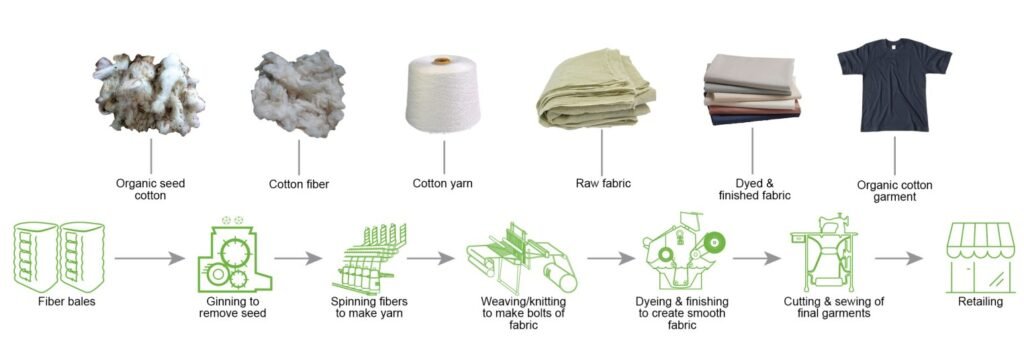Natural Fibers for a Sustainable Future
Organic Cotton: A Sustainable Choice
Welcome to our page dedicated to organic cotton, a sustainable and environmentally friendly alternative to conventional cotton. At Sustainable Weave , we are committed to providing you with high-quality apparel made from organic cotton, ensuring that your fashion choices align with your values of sustainability and ethical sourcing.

What is Organic Cotton?
Organic cotton is a variety of cotton cultivated using agricultural practices that prioritize environmental sustainability and social responsibility. It is grown without the use of synthetic pesticides, fertilizers, or genetically modified organisms (GMOs), relying instead on natural methods to maintain soil fertility and protect crops from pests and diseases.
Organic cotton farming involves a range of practices aimed at minimizing environmental impact and promoting soil health. These practices include crop rotation, cover cropping, composting, and the use of natural pest control methods such as beneficial insects and trap crops. By avoiding synthetic chemicals, organic cotton farming helps preserve soil biodiversity and reduces water pollution.

uses of Organic cotton in apparel industry
Organic cotton is utilized in various ways within the apparel industry, offering sustainable alternatives to conventional cotton and synthetic fibers. Some common uses of organic cotton include:
Clothing: Organic cotton is widely used in the production of clothing items such as t-shirts, shirts, dresses, pants, and skirts. Its softness, breathability, and durability make it ideal for everyday wear.
Denim: Organic cotton is commonly used in denim production to create jeans, jackets, and other denim garments. Its natural fibers provide a comfortable fit and a classic denim look.
Activewear: Organic cotton is increasingly being used in activewear due to its moisture-wicking properties and breathability. Organic cotton activewear offers a sustainable option for consumers who prioritize both performance and sustainability.
Undergarments: Organic cotton is often used in the production of underwear, bras, and lingerie due to its hypoallergenic and breathable nature. Organic cotton undergarments provide comfort and peace of mind for sensitive skin.
Baby and Children's Clothing: Organic cotton is a popular choice for baby and children's clothing due to its softness and chemical-free nature. Organic cotton garments are gentle on sensitive skin, making them ideal for infants and young children.
Accessories: Organic cotton is used to make a variety of accessories such as hats, scarves, bags, and socks. These accessories offer a sustainable and eco-friendly option for consumers who want to minimize their environmental impact.
Home Textiles: Organic cotton is also utilized in the production of home textiles such as towels, bed linens, and upholstery fabric. Organic cotton home textiles are free from harmful chemicals and provide a luxurious and eco-friendly option for the home.

The Sustainable Impact Of Organic Cotton: Transforming Fashion With Environmental Consciousness
Environmental Benefits:
Organic cotton offers a myriad of environmental benefits that contribute to the preservation of our planet's resources. By utilizing organic cotton, we significantly reduce the strain on natural ecosystems and minimize the carbon footprint associated with traditional cotton cultivation. According to studies by the Sustainable Apparel Coalition, the production of organic cotton requires up to 50% less water and emits approximately 20% fewer greenhouse gases compared to conventional cotton production. This substantial reduction in water usage and carbon emissions translates into tangible environmental savings, helping to mitigate the impacts of climate change and water scarcity. Additionally, by avoiding synthetic pesticides and fertilizers, organic cotton farming promotes soil health and biodiversity, further enhancing ecosystem resilience.

Resource Conservation:
Organic cotton plays a vital role in resource conservation, aligning with Sustainable Development Goal 12 of the United Nations' 2030 Agenda for Sustainable Development, which aims to ensure sustainable consumption and production patterns. According to data from the Ellen MacArthur Foundation, the fashion industry is responsible for consuming vast amounts of resources, including water, energy, and raw materials. By choosing organic cotton for our apparel production, we help alleviate the pressure on these finite resources, fostering a more sustainable and resilient supply chain. Furthermore, by promoting regenerative agricultural practices such as crop rotation and composting, organic cotton farming enhances soil fertility and reduces the need for synthetic inputs, thus preserving natural habitats and biodiversity while minimizing environmental impact.

Quality and Price:
At Sustainable Weave, we uphold the highest standards of quality while ensuring affordability for our organic cotton garments. Our commitment to quality begins with meticulous sourcing and production processes, where we prioritize durability without compromising on comfort or style. We guarantee that our organic cotton garments not only meet but exceed industry standards, offering you products that stand the test of time.
Contrary to common misconceptions, organic cotton does not come with a premium price tag. In fact, our dedication to sustainability allows us to offer competitive prices for our organic cotton garments. According to a study by the Textile Exchange, organic cotton fibers demonstrate comparable tensile strength and abrasion resistance to conventional cotton, debunking the notion that organic textiles are inherently more expensive.
We believe that sustainability should be accessible to all, which is why we strive to make our organic cotton garments affordable without sacrificing quality. Our commitment to responsible stewardship of resources extends throughout the entire product lifecycle, from design and production to wear and disposal, ensuring that you receive both exceptional quality and value for your investment.

Innovation and Versatility
Organic cotton inspires innovation and creativity, driving a paradigm shift towards sustainable fashion solutions. Through continuous research and development, we explore novel applications and techniques that harness the full potential of organic cotton. From innovative dyeing methods to cutting-edge fabric blends, organic cotton opens doors to endless possibilities in texture, color, and performance. By embracing innovation, we pave the way for a fashion industry where sustainability and style converge, empowering consumers to make conscious choices that resonate with their values.

Data and Statistics:
- According to the Textile Exchange, organic cotton production requires up to 91% less water compared to conventional cotton farming.
- The Global Organic Textile Standard (GOTS) reports that organic cotton farming reduces greenhouse gas emissions by up to 46% compared to conventional cotton cultivation.
- The Organic Trade Association (OTA) estimates that organic cotton cultivation conserves approximately 20,000 liters of water per kilogram of cotton fiber produced.

Join the Movement: Join us in embracing sustainability without compromising style. Explore our diverse collection of sustainable apparel, thoughtfully crafted with care and conscience, all made with the finest organic cotton. Together, let's redefine the future of fashion and make a positive impact on the planet, one garment at a time.
Thank you for choosing sustainability with Sustainable Weave. Together, we can weave a brighter, more sustainable future for fashion and the world. Explore our collection today and [contact us] to learn more about our commitment to sustainability or to inquire about our products.

